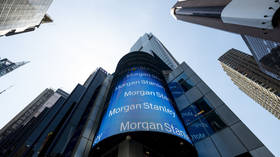Covid lockdowns leave one third of US small businesses (& almost HALF minority-owned businesses) unable to pay rent
A third of American small business owners were unable to pay rent this month, a recent survey has found. Women and minority-owned businesses were hit particularly hard, and more sectors than ever are coming up short.
Fully one third of American small business owners were unable to pay rent for January, according to the survey published on Wednesday by Alignable showing the devastating economic impact of Covid-19 pandemic shutdowns has yet to be fully realized.
The financial strife wasn’t evenly distributed – almost half of minority small business owners were unable to pay, and 35 percent of women small business owners couldn’t make ends meet.
Also on rt.com US central bank is the SERIAL KILLER of small businesses – Max KeiserWorst hit among the 10 sectors tracked by the survey were restaurants and bars – a whopping 57 percent of which failed to make rent for January. Yoga studios, retail stores, massage and beauty salons, and gyms were among the other markets most severely hit. The economic fallout has broadened significantly since November, when only beauty salons, restaurants and bars had a rent delinquency rate of over 40 percent.
A September report by crowdsourced business directory Yelp found New York, Los Angeles, San Francisco, Chicago, and Dallas had experienced the most permanent closures, with all but Dallas located in states with unusually strict pandemic policies. Alignable’s survey found businesses in New Jersey, Georgia, and Maryland were the least likely to be able to pay their January rent.
Alignable has been tracking the economic impact of pandemic shutdowns since March and noted that January’s numbers – obtained by a survey of 10,325 small business owners earlier this month – are the worst since the outbreak began. Even more alarmingly, most business owners don’t expect to see real economic recovery until May at the earliest. Nearly half reported that Covid-19 was “really impacting [their] business,” with just 18 percent stating they were either unaffected or that the worst had passed.
Of those restaurants and bars that closed their doors at some point during the pandemic, over three out of five surveyed in September expected they would be unable to reopen at all. Of those still in operation, many are placing their hopes with Covid-19 vaccine distribution to increase customers’ confidence and bring them out of their homes – even though the vaccine manufacturers have acknowledged their clinical studies were not designed to evaluate whether their jabs can slow the spread of the novel coronavirus. Newly-inaugurated President Joe Biden has nevertheless promised to vaccinate 100 million Americans in his first 100 days in office.
Also on rt.com Biden warns of ‘DEVASTATING CONSEQUENCES’ if Trump doesn’t sign Covid-19 relief bill – which he says would waste BILLIONS of $USDOver 400,000 Americans have died with Covid-19 since the outbreak began, according to statistics collected by Johns Hopkins University. The World Health Organization recently revised its criteria for diagnosing coronavirus cases, however, acknowledging that the most popular testing method was being used incorrectly and could have caused a raft of false positives.
The Biden administration has already unveiled a $1.9 trillion “American Rescue Plan” aimed at propping up state governments and small businesses as well as strengthening the safety net in order to ensure those driven out of work by the shutdowns are not also driven out of their homes.
However, with so many businesses already closed for good after 10 months of shutdowns and other virus-related restrictions, some critics have pointed to the plan as too little, too late.
Like this story? Share it with a friend!














